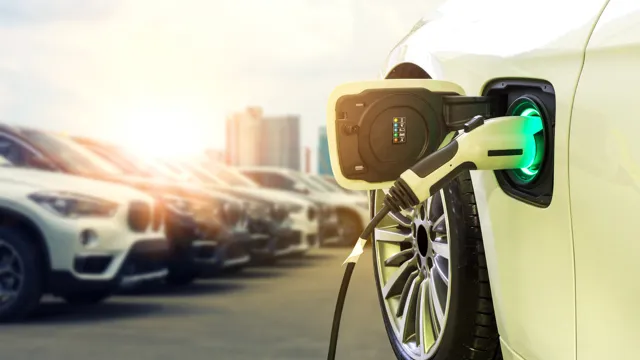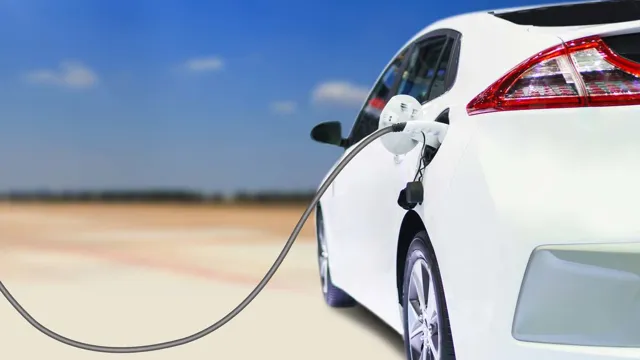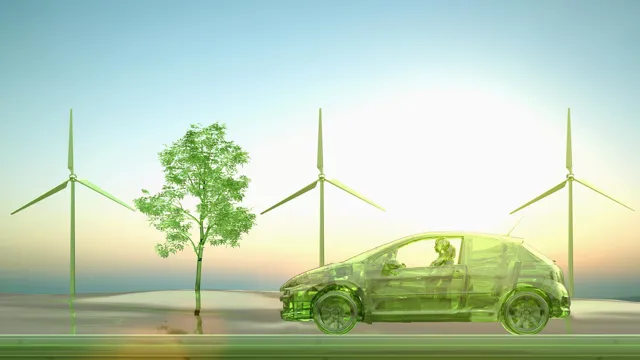Unlocking the Potential of Electric Cars: The Surprising Performance Benefits You Need to Know
If you’re looking for a car that provides not just efficiency but also superior performance, look no further than electric cars. As the world shifts towards sustainable living, the popularity of electric cars is increasing at a rapid pace. And for good reason.
When we talk about the benefits of electric cars, not only do they help the planet by reducing greenhouse gases emissions, but also they come with impressive performance features that leave traditional combustion engine vehicles in the dust. Gone are the days when electric cars were synonymous with sluggish acceleration. The latest models of electric vehicles have incredibly rapid acceleration rates, taking just a few seconds to reach speeds of 60 mph.
You can feel the instant torque of the car as soon as you press the accelerator pedal, which means you can quickly overtake other cars on the road or get out of tricky situations with ease. Furthermore, electric cars provide an incredibly smooth driving experience compared to traditional cars. Thanks to their simpler design and the absence of a bulky engine, there is little noise and vibration inside the car.
You can enjoy a peaceful, serene driving experience with no engine noise, making for a comfortable and enjoyable ride. The driving experience is further enhanced by the regenerative braking feature of electric cars. As opposed to traditional combustion engine vehicles that dissipate all of a car’s kinetic energy into heat during braking, electric cars capture and store that energy in their batteries to provide extra acceleration and range.
This makes electric cars not only more powerful but also more efficient, providing better mileage than traditional cars. In summary, the performance benefits of electric cars are significant, with rapid acceleration, a smooth driving experience, and a regenerative braking system all contributing to an enhanced, efficient, and enjoyable driving experience. And with the continued advancements in electric vehicle technology, we can only expect these benefits to improve and expand in the years to come.
Acceleration and Speed
When it comes to performance benefits, electric cars have the upper hand over traditional gas-powered vehicles. One of the most significant benefits is the instant torque that electric motors provide. This results in quick acceleration and a smooth, silent ride.
In contrast, gas-powered engines need time to build up their power, which leads to a delay in acceleration and a more jerky driving experience. Additionally, with electric cars, there is no need for gears, so the power delivery is seamless. The high efficiency of electric motors results in excellent speed, allowing electric cars to compete with traditional sports cars.
Overall, electric cars provide a thrilling driving experience while also being environmentally friendly.
Electric cars have instant torque, allowing for quicker acceleration.
Driving an electric car feels like riding a rollercoaster because of its instant torque, which allows for quicker acceleration. Compared to gas-powered vehicles, electric cars perform better in terms of acceleration because the electric motor provides power to the wheels straight away. This means there is no need for a transmission system or gears, which can cause delays in the transfer of power.
With the punch of the accelerator, the electric car can zoom off into the distance, making it ideal for quick getaways and speedy overtakes on the highway. Plus, with no engine noise, the driver can feel the full force of the acceleration and experience the sensation of speed soundlessly. All in all, if you want a car that delivers fast and exhilarating rides, an electric car may just be the perfect choice for you.

Electric cars can reach top speeds faster than traditional cars.
When it comes to acceleration and speed, electric cars have a clear advantage over traditional cars. Unlike cars with internal combustion engines, electric vehicles don’t need to shift gears, and they have instant torque, allowing them to reach top speeds faster. This means that electric cars can go from 0 to 60 miles per hour in a matter of seconds, providing a thrilling driving experience that is hard to match with traditional cars.
Moreover, electric cars can maintain their top speeds for longer periods of time, without the need for frequent gear changes or refueling stops, making them ideal for long-distance driving. If you’re looking for a car that can provide a fast and smooth ride, an electric car might be just what you need. So, why not give it a try and experience the thrill of electric driving yourself?
Efficiency and Range
When it comes to electric cars, there are numerous performance benefits that make them a great choice for eco-conscious drivers. Firstly, electric cars are incredibly efficient, meaning that they use their energy much more effectively than traditional gas-powered vehicles. This efficiency is not only good for the environment, as it means less energy is wasted, but also for drivers, who can save money on fuel costs in the long run.
Additionally, electric cars often have a longer range than their gas-powered counterparts, thanks to advances in battery technology and charging infrastructure. This means that drivers can go further on a single charge, making electric cars a practical option for longer trips. All in all, the performance benefits of electric cars make them an excellent choice for anyone looking to reduce their environmental impact and save some money on gas in the process.
Electric cars are more energy efficient than traditional cars.
Electric cars have been gaining popularity as more people are becoming aware of the significant benefits they offer over traditional gas-powered vehicles. Energy efficiency is one of the main advantages of electric cars, thanks to their advanced technology that enables them to convert a higher percentage of their stored energy into power to move the vehicle. In contrast, traditional cars burn fossil fuels, which results in significant energy loss through heat and other forms of wasted energy.
Additionally, electric cars require less energy to move the same distance as traditional cars, giving them a better range for a single charge. This means that electric cars can travel more miles on the same amount of energy, making them the more efficient and practical choice for everyday commuters and long-distance travelers alike. Overall, electric cars’ energy efficiency is a major driver of their increasing popularity, since they offer a more practical and environmentally friendly solution to transportation needs.
Electric cars can travel longer distances on a single charge.
Electric cars have become increasingly popular in recent years due to their numerous benefits over traditional gas-powered vehicles. One of the most significant advantages of electric cars is that they can travel longer distances on a single charge. This is because electric cars are more efficient than gas-powered cars, meaning that they convert a larger portion of the energy stored in their batteries into motion.
Additionally, advances in battery technology have allowed electric cars to store more energy, giving them even greater range. While electric cars used to be limited to short trips and city driving, they are now capable of covering long distances and even making road trips possible. Overall, the increased efficiency and range of electric cars make them a more practical and convenient option for modern drivers.
Regenerative braking allows electric cars to recharge their battery while driving.
Regenerative braking is a feature in electric cars that allows drivers to recharge their battery while driving. It is an incredibly efficient and practical way to extend the range of the vehicle, which is a major concern for most electric car owners. The technology works by converting the kinetic energy generated during braking into electrical energy, which is then stored in the car’s battery.
This process not only helps to recharge the battery, but it also reduces wear and tear on the brakes, making it a win-win situation. Moreover, regenerative braking is an excellent example of how electric cars can be more efficient than their gas-guzzling counterparts. While a gasoline car waste its excess energy in braking, an electric car uses that energy to power up its battery.
So, in essence, regenerative braking helps electric cars to get more mileage out of every drop of electricity.
Maintenance and Operating Costs
The performance benefits of electric cars go hand-in-hand with their significantly lower maintenance and operating costs. Unlike gasoline-powered cars, electric cars have significantly fewer moving parts, which translates to lower upkeep costs. Routine maintenance for electric cars consists of things like checking tire pressure, ensuring that the brakes are functioning properly, and replacing wiper blades – all tasks that are quite simple and inexpensive.
In addition, electric cars do not require oil changes or costly engine overhauls. When it comes to operating costs, electric cars are also much cheaper to run than traditional cars. In fact, studies have shown that drivers can save thousands of dollars each year on fuel costs alone when they switch to electric vehicles.
With their lower maintenance and operating costs, electric cars can provide significant financial benefits to drivers while also contributing to a cleaner, more sustainable future.
Electric cars require less maintenance than traditional cars.
Electric cars offer numerous benefits over traditional cars, one of which is the lower maintenance cost. Unlike vehicles that rely on internal combustion engines, electric cars have fewer moving parts which means that there are fewer components that need to be serviced or repaired. An electric car doesn’t require oil changes, spark plug replacements, or transmission fluid flushes, and there are no belts or hoses that need to be replaced either.
This not only translates into less time spent maintaining the vehicle but also means that electric car owners save money on maintenance costs. While traditional car owners can expect to spend a significant amount of money on maintenance over a year, electric car owners enjoy lower maintenance costs, which can ultimately add up to substantial savings. So, if you’re looking to save money on operating costs over the lifetime of your vehicle, an electric car is the way to go!
Electricity is generally cheaper than gasoline, reducing operating costs.
When it comes to owning and maintaining a vehicle, one of the biggest expenses is the operating costs. This includes the cost of fuel, regular maintenance, and unexpected repairs. However, if you are considering switching to an electric vehicle, you may be able to significantly reduce these costs.
One of the main benefits of electric vehicles is that they generally require less maintenance than traditional gasoline-powered cars. This is because electric cars have fewer moving parts, which means they are less likely to break down and require repairs. Additionally, electricity is generally much cheaper than gasoline, which can help you save money in the long run.
By switching to an electric vehicle, you can reduce the amount of money you spend on operating costs and put that money towards other important expenses. Investing in an electric car is not only good for the environment but also for your wallet.
Environmental Benefits
One of the biggest performance benefits of electric cars is their environmental impact. As compared to gasoline-powered cars, electric vehicles produce far fewer carbon emissions and pollutants that are harmful to the environment. This is because they do not rely on combustion to run, but on rechargeable batteries that power electric motors.
By not having to burn fuel for energy, electric cars reduce the amount of greenhouse gases that are released into the atmosphere. In addition, they do not emit harmful particles that can cause respiratory problems and air pollution. As more and more electricity is generated from renewable sources like solar and wind, the benefits of electric cars will only continue to grow.
In fact, a recent study found that electric vehicles can reduce carbon emissions by up to 70%, making them an important tool in the fight against climate change. So not only are electric cars more efficient and cost-effective, they are also better for the environment.
Electric cars produce zero tailpipe emissions.
The environmental benefits of electric cars are abundant, and one of the most significant advantages is that they produce zero tailpipe emissions. This means that they emit no pollutants or harmful gases into the environment. By driving electric cars, we reduce our carbon footprint and help promote a cleaner, healthier planet.
Unlike gas-powered cars that emit pollutants such as carbon monoxide, nitrogen oxides, and particulate matter, electric cars run on electricity from batteries that power the motor. This makes them incredibly efficient and eco-friendly. If you’re worried about the environment and looking for ways to reduce your carbon footprint, switching to an electric car is an excellent start.
Not only will you reduce your emissions, but you will also save on fuel costs and enjoy a smoother, quieter ride. Overall, electric cars are a win-win for both individuals and the planet as a whole.
Electric cars can be powered by renewable energy sources.
Electric cars have been gaining in popularity in recent years, as people become increasingly concerned about the environment. One of the major benefits of electric cars is that they can be powered by renewable energy sources like solar and wind power. This means that using an electric car can greatly reduce your carbon footprint and help to protect the planet.
With renewable energy, you can enjoy guilt-free driving, knowing that your car is not contributing to the pollution of the environment. Plus, renewable energy sources like solar and wind power are becoming increasingly accessible and affordable, making it easier than ever to power your car in an eco-friendly way. By using an electric car powered by renewable energy, you can take a positive step towards a more sustainable future.
So why not join the electric car revolution today and start enjoying all the environmental benefits that come with it?
Conclusion
In conclusion, the performance benefits of electric cars are electrifyingly impressive! From instantaneous torque and acceleration to quiet and smooth rides, electric cars offer an unparalleled driving experience. Plus, with fewer parts and lower maintenance costs, they’re not just better for the environment, they’re also a smart financial investment. So, if you’re ready to revamp your ride and join the electric revolution, don’t hesitate to plug in and power up!”
FAQs
What are the top performance benefits of electric cars?
Electric cars have instant torque, giving them faster acceleration and quicker response times compared to traditional gas-powered cars. They also have a lower center of gravity, allowing for better handling and stability on the road.
How do electric cars save money on performance?
Electric cars have lower maintenance costs, as they have fewer moving parts and don’t require oil changes. They can also save money on fuel costs, as electricity is typically cheaper than gasoline.
What is the range of electric cars and how does it affect performance?
The range of electric cars varies depending on the model, but it is generally improving as technology advances. Range can affect performance in that drivers may need to plan their routes and take longer breaks to recharge on longer trips.
What are the environmental performance benefits of electric cars?
Electric cars produce zero emissions, reducing air pollution and contributing to a cleaner environment. They also help reduce greenhouse gas emissions, which contribute to climate change.



